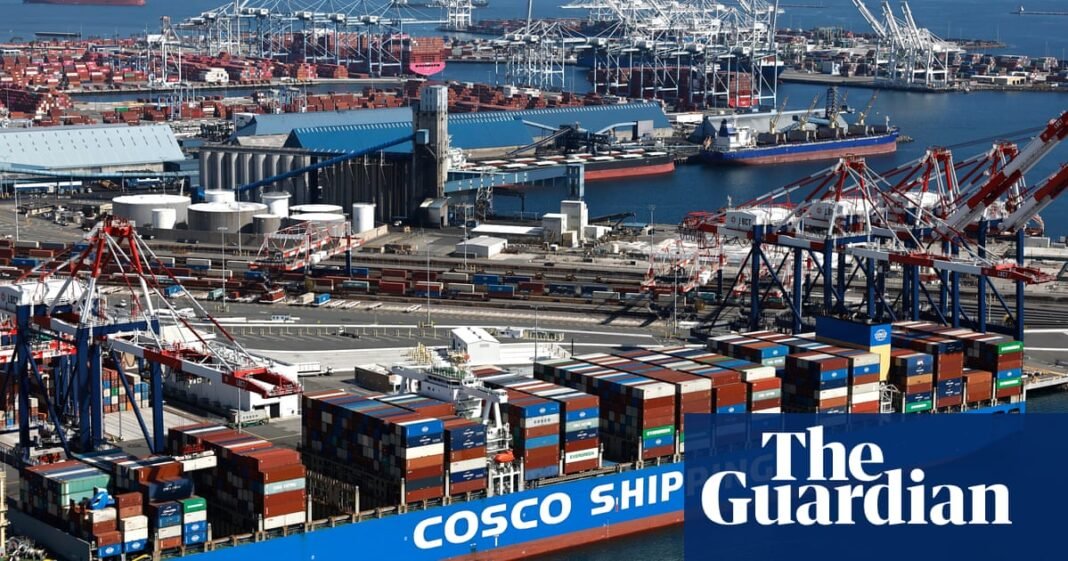Contents
- 1 Global Stock Markets Plummet as China Unleashes Aggressive Retaliatory Tariffs on US Imports
Global Stock Markets Plummet as China Unleashes Aggressive Retaliatory Tariffs on US Imports
Stock markets worldwide faced a significant downturn as China announced a staggering 34% retaliatory tariff on US imports, escalating tensions in an ongoing trade war and igniting fears of a looming global recession.
Lead: In a dramatic escalation of trade hostilities, China unveiled a 34% retaliatory tariff on imported goods from the United States on April 2, 2025, following new tariffs imposed by the Trump administration. The move signals a fierce response from the world’s second-largest economy, deepening concerns about a potential global recession. This trade conflict comes just ahead of a crucial deadline on April 9, exacerbating the volatility in stock markets across the globe.
Details of the Retaliatory Measures
Key highlights of China’s retaliatory measures include:
– **Imposition of 34% Tariff**: All imported goods from the US will incur an additional tariff, dramatically increasing costs for importers.
– **Export Controls on Rare Earths**: China announced stricter controls on rare earth materials critical for high-tech manufacturing sectors, including electric vehicles and batteries.
– **Expanded Blacklist**: The Chinese commerce ministry has added 16 more US companies to its export control list, restricting Chinese firms from engaging in trade with them.
Background on the Trade Conflict
This latest round of tariffs is rooted in a broader trade battle initiated by then-President Donald Trump’s administration, which implemented a 10% tariff on all imports from China. According to Beijing’s finance ministry, the US actions violate international trade rules and represent “unilateral bullying.”
Key quotes from Chinese officials highlight their firm stance:
– “This practice of the US is not in line with international trade rules and seriously undermines China’s legitimate rights and interests,” stated a spokesperson from China’s state council tariff commission.
Trump’s reaction was equally intense on social media, warning China against what he perceived as a panic response, stating: “CHINA PLAYED IT WRONG, THEY PANICKED – THE ONE THING THEY CANNOT AFFORD TO DO!”
Impact on Global Financial Markets
The escalation of the trade conflict sent shockwaves through financial markets:
– **US Stock Futures**: Following the tariff announcements, US stock futures fell sharply, suggesting further declines in the main indices.
– **Global Market Decline**: The FTSE 100 index in London dropped more than 300 points, marking it as the largest single-day loss since March 2023, while Europe’s Stoxx 600 index saw a slump of 4.4%.
– **Plummeting Oil Prices**: Brent crude oil prices dropped 6.6% to $65.50, the lowest in nearly two years, reflecting concerns over economic slowdowns worldwide.
Investment bank JP Morgan ramped up its prediction of a global recession risk, now estimating a 60% chance of recession by year-end, up from 40% previously.
Expert Insights on Trade Relations
Economists and analysts have varied interpretations of the situation:
– **Wang Wen, Dean of Chongyang Institute**: Wang expressed that while China would not succumb to US pressure, it remained open to respectful cooperation. He noted that retaliatory actions were restrained and focused on trade.
– **Stephane Ekolo, Market Strategist**: Ekolo described China’s reaction as significant and aggressive, warning investors to prepare for an extended trade conflict.
Shameen Prashantham, a professor in Shanghai, added a sobering perspective: “This ongoing trade war represents a body blow to global trade. I just can’t see how there are going to be many winners in this.”
Consequences for Chinese Industries
The tariffs are expected to severely affect various sectors of the Chinese economy, especially:
– **Fast Fashion Industry**: Brands like Temu and Shein, which have thrived in the US market due to a loophole allowing duty-free shipments under $800, will face substantial restrictions from May.
– **Textile Sector Concerns**: The National Textile and Apparel Council in China has condemned the US tariffs, arguing they undermine the global textile industry’s supply chain resilience.
Changing Import Regulations
From May 2025, US import rules will change significantly:
– **Duty-Free Packages**: Approximately 60% of duty-free items arriving in the US currently come from China. This threshold will reduce, limiting packages to goods valued at less than $800 and imposing a tariff of 30% of the package value, escalating to $50 in June.
International Reactions and Ongoing Legal Strategies
China has taken its grievances to the World Trade Organization (WTO), filing a lawsuit against the United States for the tariffs, claiming these actions violate global trade agreements and hurt legitimate commerce.
This lawsuit aims to reinforce China’s position on the international stage and potentially mobilize support from allies facing similar tariff threats.
Looking Ahead: Speculations on Potential Resolutions
Analysts had previously entertained hopes for a resolution before the April 9 deadline for the imposition of US tariffs. Speculation included:
– **Potential Trade Deals**: There were discussions concerning the sale of TikTok’s US operations to an American entity as a bargaining chip in trade negotiations, indicating that Trump might use tariffs as a leverage tool.
Despite these speculations, the enforcement of aggressive tariffs by both parties suggests that this conflict may deepen before any potential resolution surfaces.
Conclusion: The ongoing trade war between China and the US marks a critical juncture for the global economy. With escalating tariffs and market responses, stakeholders worldwide must navigate this turbulent landscape. As the situation evolves, the effects on trade, investment, and economic stability will remain a focal point for governments and businesses alike.
Keywords: China US trade war, global recession, 34% retaliatory tariffs, stock market decline, economic impact, export controls, rare earth materials, international trade rules.
Hashtags: #TradeWar #ChinaUSRelations #GlobalEconomy #Tariffs #RecessionRisks #StockMarketNews
Source link




